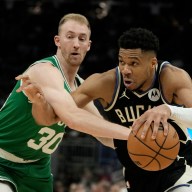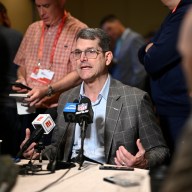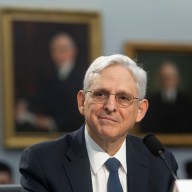Demetri Martin misses New York. Yes, he misses the actual city, having been a native New Yorker who relocated to Los Angeles in 2009. But the comic, actor, “Daily Show” alum and now — with the indie comedy “Dean,” which just premiered at the Tribeca Film Festival — film director is also beside himself about the places he finds have disappeared every time he returns. He misses Yaffa Cafe, the East Village standby which shuttered in 2014. He misses how what was once the dirty, wonderful Bowery has gone almost entirely upscale. “It’s a little but shocking how much it changes when you leave New York,” Martin tells us. “It’s like watching a nephew or a son grow. When you’re with them every day you can’t tell how tall they’re getting. Then you don’t see them for six months.” RELATED:Tribeca interview: Emory Cohen on “Detour” and life post-“Brooklyn” He has little time for milling about the city, however, because he has to talk about “Dean,” which Martin — who, by the way, is a seriously youthful-looking 42 — wrote, directed and starred in. The film follows an illustrator whose mother has recently died. Partly to clear his head, he heads out to L.A. and winds up in an ambiguous courtship with a local (played by Gillian Jacobs). Film directing is new to Martin, but at least he’s had some great bosses. Among his acting credits include a bit part in Steven Soderbergh’s 2011 pandemic saga “Contagion” and the lead in Ang Lee’s “Taking Woodstock.” On both he would carefully watch how they worked: Lee methodical, Soderbergh lightning fast yet scarily precise. (The crew on “Contagion” told Martin they moved so quickly they’d often bang out each day’s shots before lunch.) RELATED:Tribeca interview: Carla Gugino on “Wolves” and working with Michael Shannon “Even back then I wanted to direct. I wanted to tell stories, to take my sensibility and see if I can put it into a narrative that’s not just one-liners,” Martin explains. He was often worried that he’d get on set unprepared, not sure what he wanted. “It turned out I had specific ideas — more than I expected,” Martin says. He found himself naturally able to think about how to find visual ways to sell comedy. He knew when he wanted a conversation scene to be filmed so that both people are in the frame, not cutting from close-up to close-up. “I want the viewer’s eye to travel in the conversation. I don’t want to take their head and go, ‘Look at her, look at him.’” Martin’s own stand-up is visual, favoring drawings and other image-based aids. He says some of his comedy idols were visual even when they were strictly verbal.
“What I loved about Steven Wright when I first saw him in high school or Woody Allen’s standup — or Gary Larson, though he’s a cartoonist — is how visual a lot of their humor is,” Martin says. “They’ll tell you something and you picture the situation. It could be something absurd, like Woody Allen telling you about a moose or that he’s in his red pajamas and these guys hook up and they make a fire engine. There’s a narrative movie you’re playing in your head.” RELATED: 12 films to see at the Tribeca Film Festival There were even practical reason or making his character an illustrator. “It gave me another leg to stand on, especially when I got into post[-production],” he says. “If I got into trouble, at worst I could have a drawing show what he’s dealing with or where the story’s taking us.” Martin actually found the hardest part to be producing. Directing, he says, is performative, not unlike stand-up: You’re leading a cast and crew. But he had to worry about things like locations that were suddenly not available day-of, or other practical concerns — headaches he’s long had to deal with doing comedy on the road. “When I’m on-stage, it’s great. That’s the easy part, in a sense,” says Martin. “The hard part is TSA, the rental car, getting my bag, getting to the hotel and finding two hotels have similar names and I went to the wrong one. I’ve learned that enduring that almost earns, for me, the luxury and the privilege of being on-stage and having a creative career. That’s what it feels like directing a low budget movie.” RELATED: Steven Soderbergh on “The Girlfriend Experience,” VR and beign a snob Martin is the latest in a long line of comics who’ve transitioned to directing movies. One of the greats is Albert Brooks. As it happens the two are close friends.
“He and his wife adopted me and my wife,” he says, enthusiastically. “I tried not to be too much of a fan. I just tried to play it cool. Nowadays, if we’re at his place for a party, he’ll turn to me and start telling me stories from ‘Defending Your Life’ or ‘Lost in America.’” Brooks even told Martin all about his friendship with Stanley Kubrick. The legendary filmmaker was a massive fan of Brooks’ bleak 1981 relationship comedy “Modern Romance,” so much that they developed a phone friendship. “An assistant would call him and say, ‘Would you be home Thursday at 3 o’clock? Stanley wants to do a phone call’” Martin says. “All of a sudden, he’s buddies with Stanley Kubrick!”
Tribeca interview: Demetri Martin becomes a director with ‘Dean’
Follow Matt Prigge on Twitter @mattprigge

















